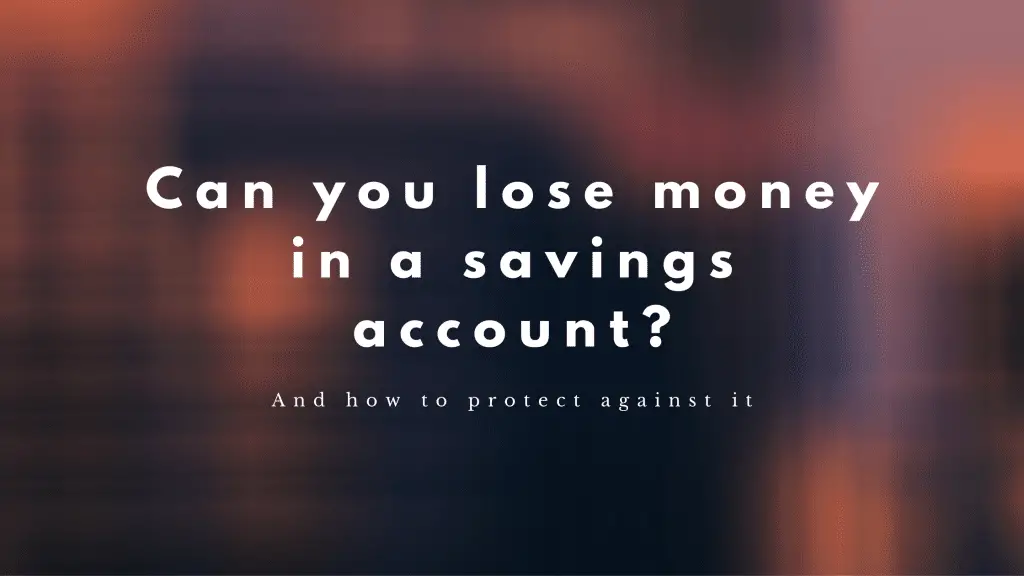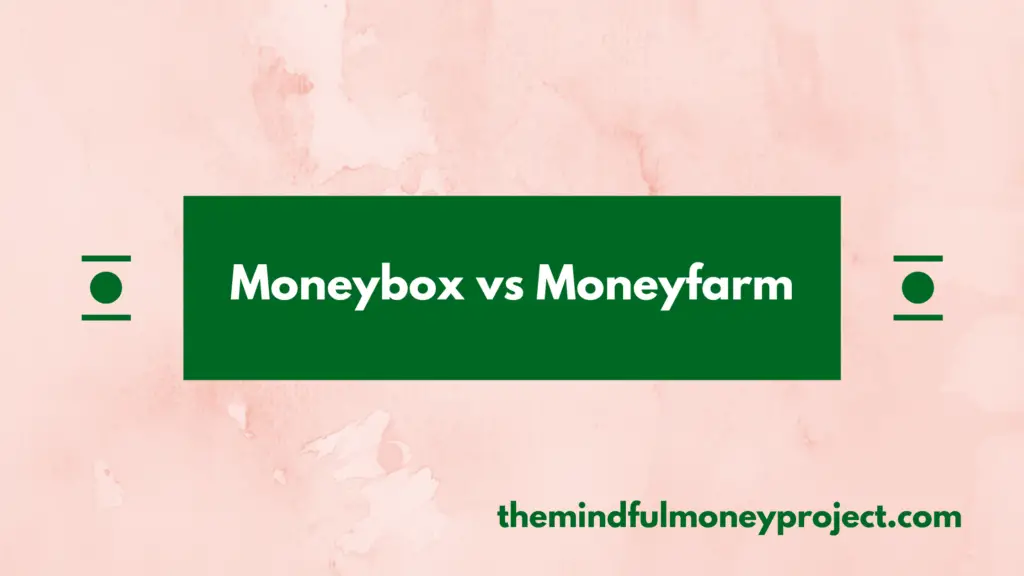This will be counter-intuitive to a lot of people reading this, but is it really possible to actually lose money in a savings account? I’m not talking about some whacky negative interest rate either (which might not be as far-fetched as it sounds). If you stick with me, I’ll discuss whether you can lose money in a savings account, as well as how to set up your savings to actually grow your wealth over time.
I’ll discuss how to ensure your savings are protected against your bank going out of business, but also will discuss an invisible force that is slowly chipping away at your savings whilst you sleep without you knowing, and what you can do to protect against it.
Protect against your bank closing
Wondering whether, or how much, cash you should hold in a savings account? Worried you can lose money in a savings account? Well, you need to be aware of the FSCS deposit protection scheme and understand if you’re left unprotected in the case of your bank (or building society) closing down.
The FSCS deposit protection scheme was set up in the early 2000s to help compensate any customers of failed (or closed) financial institutions as long as they were authorised and regulated by the Financial Conduct Authority.
It currently covers up to £85,000 in cash savings at the time of writing per person, per institution. It can be hard to know who actually owns who in the financial world, as some banking brands are owned by the same financial institution. To find out who your banks are actually owned by, use this handy tool from Which?.
ACTION: If you have more than £85,000 in savings (and it is not due to a temporarily high balance such as a house sale), then make sure you split your savings into separate accounts with completely separate financial institutions (who are protected by the FSCS deposit protection scheme).
For more info on the FSCS deposit protection scheme, I’ve included some FAQs and further links at the end of this article*.
The invisible erosion
Other than making sure you don’t physically lose your cash due to a bank failure which takes your money with it, you’ll need to be aware of the invisible erosion of your savings over time.
Who is this devilish hidden money-grabber?
You’ve probably heard of it….:
Inflation.
You’ve probably heard of inflation in the news or heard your Dad talking about it despondently, but inflation does have relevance to your personal finances and is a very important concept to understand.
What is inflation?
I still find myself being shocked by the impact of inflation, only the other day I was walking in the park and fancied an ice cream, only to find myself picking my jaw off the ground as I perused the menu to discover the beloved “99” is now £2.50 (maybe he was just a rip-off merchant but I’m glad he no longer named it the 99)!
Inflation is the rise in the price level of goods and services. This results in the purchasing power of your money decreasing over time, meaning you can buy less with the same £1 than you would have been able to in the past.
For illustration, this chart from in2013dollars.com shows us that £10 in 2000 is now only worth £5.73 in 2020 in terms of what you can buy with it (it’s purchasing power). So if you bought a basket of goods in 2000 with £10, you would only be able to buy about 57% of that same basket of goods in 2020 with a tenner(!).

How does that work?
Well as the price of goods and services increases each year, it means that the same amount of money you hold can buy less and less.
So to bring it to life, if in 2000 you could buy one hardback book for £10, in 2020 that same hardback book will be £16.94 (assuming the price of hardback books grew in line with inflation). This means that if you simply took that £10 and kept it under your mattress, and 20 years later expected to be able to buy the same book, you’d be £6.94 short.
How does it result in you losing your savings?
If your savings don’t keep pace with inflation, then you will actually be losing money over time because the same cash will be able to buy less as time goes on. If saving money in a savings account is your strategy to grow rich and wealthy, you need to change strategy!
At the moment we live in such a historically strange, low-interest rate environment that it is going to be very hard to find a savings account that has an interest rate higher than the inflation rate, so be mindful of how much you keep in cash savings as this money is not going to grow in line with inflation which means that, over time, it is actually losing value.
Even in the face of a decline in value due to inflation, keeping money in cash has its advantages though;
When to keep your cash in savings
Really you should keep your cash in savings in two main instances:
- As an emergency fund
- Savings for short term financial goals
For an emergency fund, the key priority is being able to access the cash when you need it. This means that it needs to be easily-accessible. The goal of this fund is not to grow your wealth and make you rich, it is simply a back-up fund to help you absorb life’s face-slaps.
For short-term financial goals, it makes sense to keep in a savings account rather than investing, as investing tends to provide volatile returns in the short-term, but predictable inflation-beating growth in the longer term (5 years+). This means though that if you are looking to save for something less than 5 years (think house deposit or weddings), it is better to keep it in a cash savings account rather than risk a short-term drop in the stock market right around the time you need to use the cash.
How much to keep in your cash savings account?
You’ll know how much you’ll need in cash for your short-term financial goals, but good advice for your emergency fund is 3-6 months’ worth of expenses. Increase this to 6-12 months’ worth of expenses if you’re in a period of uncertainty over either unexpected expenses or drops in income.
Actions: what to do to stop me losing money in a savings account
To stop yourself from losing money in a savings account, you’ll need to do a few things:
- Start investing
- Shop around for better interest rates
Start investing
Assuming that you have already paid off your consumer debts and have built up a robust emergency fund of at least 3-6 months’ worth of expenses, now is the time to start investing to move the needle on growing your wealth and working towards your long term financial goals.
For any amounts that are not allocated to your emergency fund or for short-term financial goals, start to funnel into investments.
Look for diversified asset classes with low-cost management fees (such as index funds). Index fund investing, where you aim to match, not beat the wider market will give you inflation-beating returns that means that your money grows over time. This’ll keep the greedy hands of Mr inflation off ya back!
Shop around
For the amounts you want to keep in savings accounts as an emergency fund and as a pot to work towards your short-term savings goals, now is the time to shop around the market and find the highest paying suitable savings account.
For an emergency fund you want to make sure the savings account is easily accessible (don’t lock your money away with no-access savings accounts just for a higher interest rate as it is critical your emergency fund is there for you when you need it).
By moving these to the highest paying savings account you can find, it will reduce the impact of inflation, but is unlikely to completely mitigate it (inflation tends to sit at a 2% level and in the current climate it is very hard to find a savings account that pays that kind of interest rate).
Remember the FSCS deposit protection scheme limit of £85,000.
Conclusion
Can you lose money in a savings account? Even though people have an impression that the safest place to put your money is in a savings account in a bank, they fail to understand the crippling long-term effects of inflation on their wealth, and so the answer is yes, you really can. Not due to bank failure, but due to inflation.
Only have a robust emergency fund and any short-term financial goals in savings. To grow your wealth, it is critical that you funnel any funds above your emergency fund/short-term goals into investments that regularly and consistently beat inflation. Investing in the stock market via low-cost, diversified index funds should provide you inflation-beating returns.
Has anyone else come across some absolute zinger of an inflation wake up call like my ice-cream eye-opener? I’d love to hear of them, drop a comment in the comments section below!
*FSCS Deposit Protection Scheme FAQs
Do you lose your money if a bank closes? Yes, but you can claim compensation up to the £85,000 limit via the FSCS deposit protection scheme.
Is it better to have one bank account or several? The scheme limit applies up to £85,000 per bank/building society, including groups. Be wary that some banking brands are actually part of the same banking group and therefore all count towards the one £85k limit. If you have two accounts with two separate banks that are not part of the same group, you will have two lots protected up to the £85k limit each.
Because its not always clear who owns who in the banking market, use this handy tool from Which? to find out.
What if my balance is temporarily higher than the limit? Yes, you will get temporary cover for up to 6 months after the date your account was first credited for up to £1m. For example if you have just sold your home which gives you a temporarily high balance over the limit.
Where can I find more information on the scheme?
The Money Advice Service has a detailed article all about the scheme, as well as Which?
What Makes You A Millionaire (UK)
Attaining the title of “millionaire” is an aspirational goal for many. Lots of people want…
How Much Should You Invest As A Beginner?
Investing is the more glamorous side of personal finance. But it can seem like an…
Moneyfarm vs Vanguard: Lowest Fees On The Market?
Investing is the most impactful tool you have to reach an ambitious financial goal. Sometimes…
How to cancel The Economist subscription and stop it from auto-renewing
I always harp on about giving your finances a shot in the arm by cutting…
The 7 biggest finance mistakes young professionals make in their 20s
Your 20s are a fantastic period of time. You’ve finished uni and, hopefully, put your…
Plum vs Yolt: Which One Will Save You Cash?
Being a bit of a personal finance nerd, I have been absolutely spoiled for choice…
Yolt vs Money Dashboard – Who Wins?
We have an app for everything nowadays. Using an app can remove the heavy lifting…
Best Investment Apps for Beginners UK: Get Savvy And Build Wealth With These
In our list below, you’ll find the best investment apps for beginners UK. They cover…
Moneybox vs Moneyfarm
In the market for a robo adviser but not sure which one to pick? Scouring…











Pingback: Should I Save an Emergency Fund or Pay Off Debt? | The Mindful Money Project